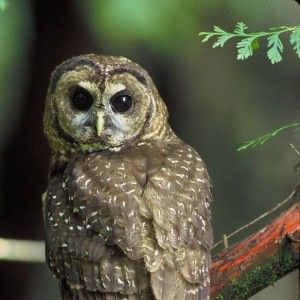
Publisher:
Bonnie King
CONTACT:
Newsroom@Salem-news.com
Advertising:
Adsales@Salem-news.com

~Truth~
~Justice~
~Peace~
TJP
Dec-16-2010 16:50

 TweetFollow @OregonNews
TweetFollow @OregonNews
Science Review Raises Doubts about Spotted Owl Plan
Salem-News.com20 organizations signed a comment letter to the U.S. Fish and Wildlife Service raising concerns and recommending changes to ensure owl recovery.
 Northern Spotted Owl - USFWS photo |
(WASHINGTON D.C.) - As the public comment period on the Administration’s latest draft Northern Spotted Owl Recovery Plan closed yesterday, peer reviews by three scientific societies reveal substantial flaws in the Plan.
A key concern of the reviewers is that the plan calls for extensive logging of owl habitat to reduce fire risks, a course not backed by science, and one that may harm Spotted Owls and reduce the likelihood of their recovery.
The Plan for the threatened owl species was being rewritten to address previous criticisms that it ignored existing science and an Inspector General investigation that found the original plan had been undermined by political interference.
“The release of this revised owl plan was a good first opportunity for the Administration to show they were serious about following the best available science,” said Steve Holmer, Senior Policy Advisor for American Bird Conservancy.
“It was an opportunity missed. The Administration needs to take a hard look at the peer reviews and scale back their plans to log owl habitat. This is a real disappointment with potentially disastrous consequences for owl recovery unless this plan is overhauled.”
Following intensive criticism of how science was misused during the last administration, this Administration promised a renewed commitment to the government’s use of sound science and issued the Presidential Memorandum of Scientific Integrity in 2009.
In 2010, responding to internal investigations that found that political interference had previously undermined the use of the best available science at the Department of the Interior, Secretary Ken Salazar issued a similar science directive (Secretarial Order 3305) in Sept. 2010.
Peer reviews by The Wildlife Society, Society for Conservation Biology, and American Ornithologists’ Union concluded that the current draft was incomplete because the design for the owl reserves was not included in the draft and therefore could not determine whether the amount of habitat being conserved was sufficient.
The reviews also found that there were significant shortcomings regarding maintenance of reserves in dry forest types and fire management. Recent peer reviewed studies were not included in the draft, while non-peer reviewed material was heavily relied on to justify the plan’s management direction.
For example The Wildlife Society review states: “The Service’s strategy for no reserves in dry forests in the eastern Cascades is exacerbated by the proposals for aggressive management of these dry forests because the treatments will reduce the amount of closed canopy forests in the landscape and reduce the amount and suitability of habitat for the subspecies. These proposals are not based on a complete review of the available science and they rely on unpublished reports.”
Twenty organizations, including American Bird Conservancy, the Cornell Lab of Ornithology, and partner organizations in the Bird Conservation Alliance signed a December 15 comment letter to the U.S. Fish and Wildlife Service raising these concerns and recommending changes to ensure owl recovery.
A key paragraph in the letter states: “… a number of deficiencies identified in peer reviews by the scientific societies that reviewed the original plan have yet to be adequately addressed in the areas of active management and fire. Of particular concern are recommendations for extensive thinning treatments without empirical studies on the effects of these treatments on Spotted Owls or their prey. Further, estimates of owl habitat loss from fire are not based on defensible data sources and we are concerned that the Service has not adequately addressed post-fire logging, which may be an even greater threat to owls than fire.”
To view the letter, click here. The letter was based on a comprehensive set of comments developed by plaintiff groups in the Spotted Owl case which are available here. Click here for The Wildlife Society peer review and click here for the review by the Society for Conservation Biology and American Ornithologists’ Union.
Source: American Bird Conservancy
Articles for December 15, 2010 | Articles for December 16, 2010 | Articles for December 17, 2010


Salem-News.com:

Quick Links
DINING
Willamette UniversityGoudy Commons Cafe
Dine on the Queen
Willamette Queen Sternwheeler
MUST SEE SALEM
Oregon Capitol ToursCapitol History Gateway
Willamette River Ride
Willamette Queen Sternwheeler
Historic Home Tours:
Deepwood Museum
The Bush House
Gaiety Hollow Garden
AUCTIONS - APPRAISALS
Auction Masters & AppraisalsCONSTRUCTION SERVICES
Roofing and ContractingSheridan, Ore.
ONLINE SHOPPING
Special Occasion DressesAdvertise with Salem-News
Contact:AdSales@Salem-News.com

Terms of Service | Privacy Policy
All comments and messages are approved by people and self promotional links or unacceptable comments are denied.
[Return to Top]
©2026 Salem-News.com. All opinions expressed in this article are those of the author and do not necessarily reflect those of Salem-News.com.